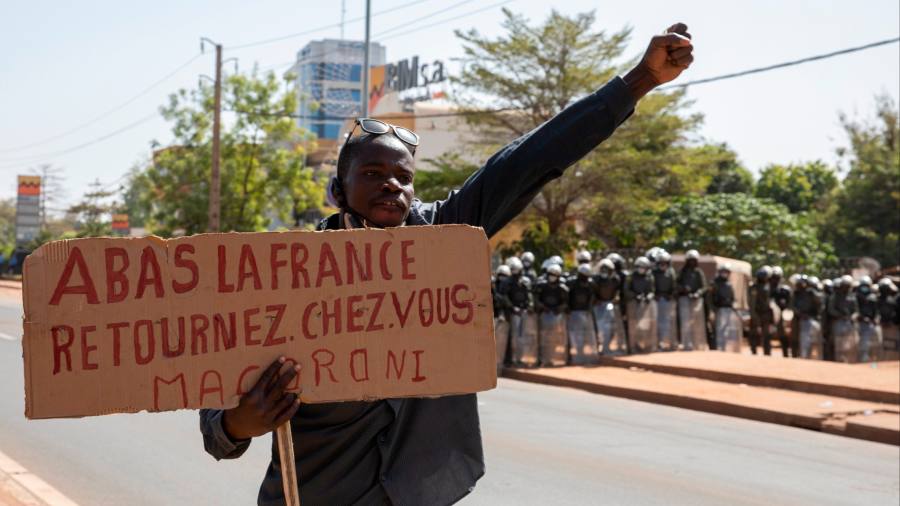The president of Niger has defended France’s actions in the troubled Sahel region, saying Paris had been the victim of propaganda and populist anti-neocolonial sentiment.
“It’s true that French policy in Africa is not a great success right now,” President Mohamed Bazoum, who has emerged as the west’s staunchest ally in the region, told the Financial Times.
“But is it France’s fault? I don’t think so. France is an easy target for the populist discourse of certain opinions, especially on social media among African youth.”
Anti-French sentiment is strong in many former French colonies in the Sahel, the semi-arid strip south of the Sahara desert which has been convulsed by jihadist violence perpetrated by groups linked with Islamic State and al-Qaeda.
Paris has been blamed for triggering the crisis in Libya, for failing to quell the jihadist threat and for backing unpopular leaders. Mali, which expelled France after the first of two coups in 2021, has contracted Russia’s Wagner mercenary group to help it fight the insurgency. There are concerns that Burkina Faso, now also under military rule, could follow suit. Niger’s president said he believed the regime in Ouagadougou when they said that Wagner was not in Burkina.
Bazoum said Wagner had been ineffective in Mali, where it has been accused by human rights groups of atrocities. The instability in the north of the country had worsened since Wagner’s arrival, he said, pushing refugees into both Niger and Algeria.
On France, he said: “Its adversaries want to project an image of France as a neocolonialist power. Some people stick to that cliché, which is not true, but which is very useful for propaganda.”
Bazoum downplayed domestic criticism of his decision to increase the French military presence in Niger, saying intelligence from Paris was a big help in Niger’s own war on terror. France has a large military base in Niamey while the US has a drone base near the northern city of Agadez.
Terrorist activity has been steadily increasing in Niger, much of it spilling over the border from Burkina Faso, where, by some estimates, the government controls only 40 per cent of the territory. “In Burkina, things have got a lot worse over the past year. It’s a story of deterioration,” Bazoum said.
Ibrahim Yahaya Ibrahim, a senior Sahel analyst at the International Crisis Group, said Bazoum’s pro-western stance had received a mixed reception at home, where he had taken “quite a hit”. “The same anti-French discourse that has proliferated in Mali and Burkina Faso is also present in Niger,” he added.
Bazoum deserved credit for improving security in Niger, Ibrahim said, especially at a time when jihadis were gaining ground in the region, as well as for his stance against corruption. But he had had less success in improving education in a country with one of the world’s lowest literacy rates, Ibrahim said. The team around the president was “weak”, he added.
Bazoum’s election in 2021 marked Niger’s first democratic transition since independence from France in 1960 and he has come to be seen as a key western ally in the fight both against terrorism and creeping military rule.
Antony Blinken this year became the first US secretary of state to visit Niger in the country’s history, underlining its growing strategic importance.
“Niger is a young democracy in a challenging part of the world, but it remains true to the democratic values that we share,” Blinken told his hosts during his visit to Niamey where he pledged $150mn of additional humanitarian assistance to Sahelian countries.
Niger remains a fragile democracy and one of the poorest countries in the world. It is losing nearly 500 football pitches of arable land per day to desertification, according to the UK’s Africa minister Andrew Mitchell, who also visited Niger this year.
Bazoum, whose administration was rattled by a coup attempt two days before his inauguration in 2021, said institutions were strengthening despite persistent problems of instability, poverty and hunger in some parts of the country. There was “zero chance” of a military takeover, he added.
Read the full article here




